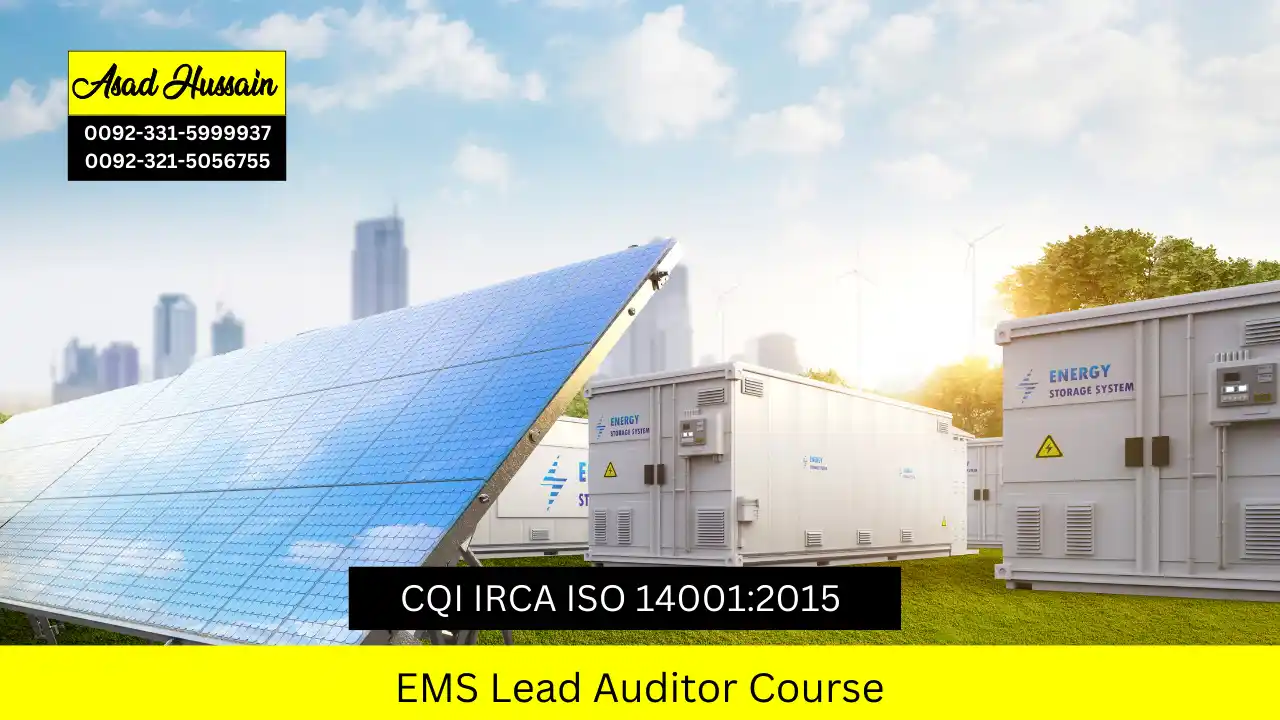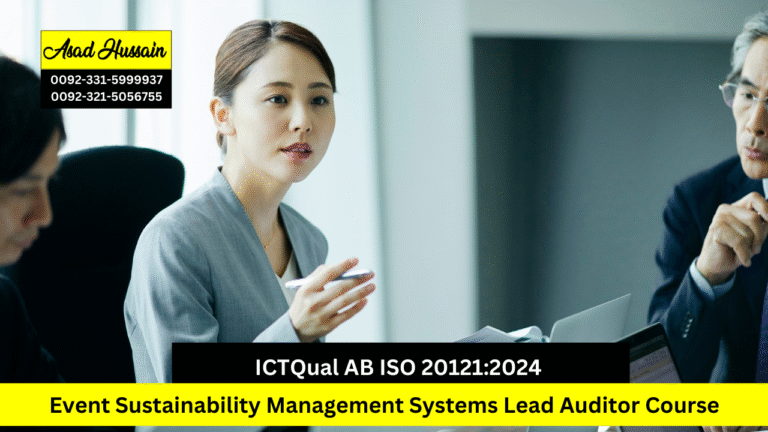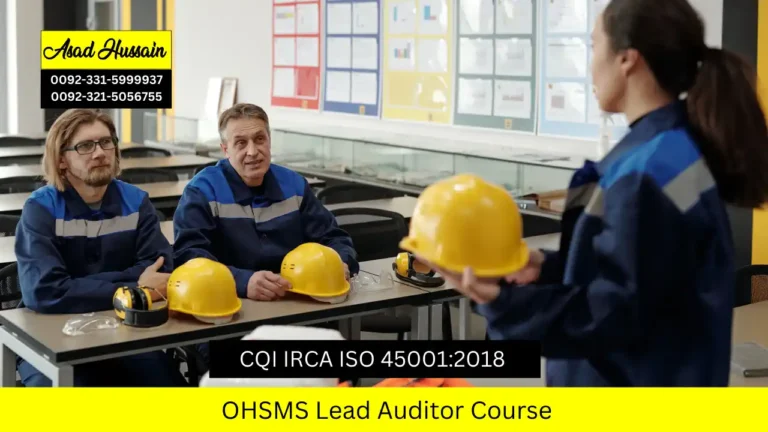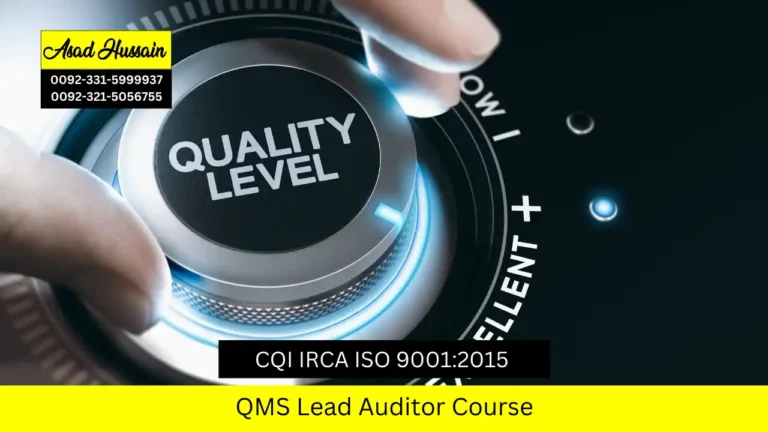Unlock the power to drive sustainable change within organizations with the CQI IRCA ISO 14001:2015 EMS Lead Auditor Course — your gateway to mastering Environmental Management System auditing. This globally recognized course equips professionals with the expertise to assess, manage, and improve environmental performance in alignment with ISO 14001:2015 standards. Whether you are an environmental consultant, quality manager, or aspiring auditor, this intensive training provides the tools needed to lead audits that ensure compliance, reduce risks, and promote eco-friendly business practices.
Designed for ambitious professionals, the course blends theoretical knowledge with practical auditing skills, fostering confidence to lead EMS audits independently. With a focus on real-world application, it helps you understand the structure and requirements of ISO 14001:2015, learn effective audit planning, execution, and reporting techniques, and develop competencies to identify non-conformities and opportunities for continual improvement. Upon completion, you’ll earn a CQI IRCA-approved certification, globally recognized as a benchmark of excellence in EMS auditing.
The CQI IRCA ISO 14001:2015 EMS Lead Auditor Course covers comprehensive modules, starting from the fundamentals of environmental management systems to advanced auditing principles tailored specifically for ISO 14001:2015. You will explore key clauses of the standard, understand organizational context, leadership roles, risk-based thinking, and compliance obligations essential for maintaining an effective EMS. CQI IRCA ISO 14001:2015 EMS Lead Auditor Course places strong emphasis on audit processes including initiation, preparation, on-site audit techniques, and follow-up activities.
Interactive learning sessions, case studies, and group exercises ensure practical exposure to audit scenarios, enhancing your ability to conduct objective evaluations and generate impactful audit reports. Participants also learn how to communicate audit findings effectively to various stakeholders, helping organizations implement corrective actions that support sustainable environmental goals. CQI IRCA ISO 14001:2015 EMS Lead Auditor Course is ideal for those aiming to become certified lead auditors or improve their current auditing capabilities.
By enrolling in CQI IRCA ISO 14001:2015 EMS Lead Auditor Course , you join a network of professionals committed to environmental stewardship and operational excellence. The CQI IRCA certification not only boosts your professional credibility but also opens doors to career advancement in quality, compliance, environmental consultancy, and risk management fields. Stay ahead in a world increasingly driven by environmental responsibility and regulatory compliance with this essential EMS lead auditor training.
Program Highlights
The CQI IRCA ISO 14001:2015 EMS Lead Auditor Course Consist of following core units.
Mandatory Units
- Introduction to Environmental Management Systems (EMS) and ISO 14001:2015
- ISO 14001:2015 Requirements
- Fundamentals of Auditing and ISO 19011 Guidelines
- Audit Planning and Preparation
- Conducting the Audit – On-site Activities
- Audit Reporting and Follow-Up
- Leading an Audit Team
To ensure candidates are well-prepared to benefit from the course, the following eligibility criteria apply:
Minimum Age:
Applicants must be at least 18 years old at the time of enrollment.
Educational Qualifications:
Candidates should have completed at least a secondary school education or an equivalent qualification such as a high school diploma or vocational certification. A foundational understanding of environmental management principles is preferred. While not mandatory, completing an ISO 14001:2015 Foundation or Awareness course prior to enrollment is highly recommended.
Professional Experience:
Ideal candidates have some experience working with Environmental Management Systems (EMS) or in related roles. This could include involvement in internal audits, EMS implementation projects, or activities related to environmental compliance. Although prior audit experience is advantageous, it is not a strict requirement.
English Language Proficiency:
Since the course is conducted and assessed in English, candidates must possess adequate English language skills to fully participate. This includes:
- Reading: Ability to comprehend technical standards and related documentation
- Writing: Capability to complete written assignments and the final exam effectively
- Speaking and Listening: Competence in engaging in group discussions, presentations, and audit role-plays
1. Introduction to Environmental Management Systems (EMS) and ISO 14001:2015
- Grasp the core principles and objectives of Environmental Management Systems (EMS).
- Understand the benefits and critical importance of implementing an EMS within organizations.
- Outline the scope, framework, and structure of the ISO 14001:2015 standard.
- Define key terms and concepts related to environmental management and ISO 14001.
- Recognize how EMS supports sustainable development and helps achieve regulatory compliance.
2. ISO 14001:2015 Requirements
- Interpret and explain the detailed clauses and requirements of the ISO 14001:2015 standard.
- Analyze the organizational context and its impact on EMS planning and implementation.
- Understand leadership roles and the significance of top management commitment to EMS success.
- Identify requirements related to environmental risk assessment, objective setting, and strategic planning.
- Explain operational controls and processes essential for managing environmental aspects.
- Understand the processes for performance evaluation, monitoring, measurement, and continual improvement under ISO 14001:2015.
3. Fundamentals of Auditing and ISO 19011 Guidelines
- Describe the objectives, types, and fundamental principles of auditing.
- Understand the structure and guidance provided by ISO 19011:2018 for auditing management systems.
- Recognize auditor responsibilities, ethical standards, and the nature of audit evidence.
- Differentiate between first-party (internal), second-party (supplier), and third-party (certification) audits.
- Understand the role of ISO/IEC 17021 in the certification process.
4. Audit Planning and Preparation
- Develop thorough audit plans aligned with defined scope, objectives, and criteria.
- Conduct document reviews to assess the readiness of the EMS for audit.
- Prepare effective audit checklists and allocate responsibilities within the audit team.
- Determine necessary audit resources, schedules, and communication plans.
- Identify and mitigate audit risks and manage logistics before on-site activities.
5. Conducting the Audit – On-site Activities
- Lead opening meetings and build positive rapport with auditees.
- Apply effective communication and interviewing techniques throughout the audit.
- Collect, verify, and document objective evidence via observations, inquiries, and records review.
- Accurately record audit findings in a structured, factual manner.
- Maintain professionalism and handle challenging situations during audits.
6. Audit Reporting and Follow-Up
- Classify audit findings into nonconformities, observations, and opportunities for improvement.
- Prepare clear, concise, and evidence-supported nonconformity reports.
- Compile comprehensive audit reports that comply with organizational and ISO standards.
- Conduct closing meetings with auditees and stakeholders effectively.
- Understand and manage the follow-up process, including reviewing corrective actions and verification.
7. Leading an Audit Team
- Define the roles, responsibilities, and essential qualities of a lead auditor.
- Assign tasks and provide clear guidance to audit team members.
- Facilitate effective team meetings and ensure consistent evaluation of audit evidence.
- Manage conflicts, time, resources, and expectations throughout the audit process.
- Demonstrate leadership in coordinating multi-auditor and multi-site audits successfully.
- Environmental managers and officers responsible for implementing or maintaining Environmental Management Systems (EMS)
- Quality, compliance, and sustainability professionals seeking to enhance their environmental auditing skills
- Internal auditors and EMS team members aiming to develop lead auditor competencies
- Consultants and auditors who perform or aspire to conduct ISO 14001:2015 EMS certification audits
- Professionals involved in regulatory compliance, environmental risk assessment, or sustainability reporting
- Individuals seeking international recognition as certified EMS lead auditors to advance their careers
- Project managers and operational staff involved in environmental management initiatives
- Anyone with a background or interest in environmental management looking to gain practical auditing expertise





